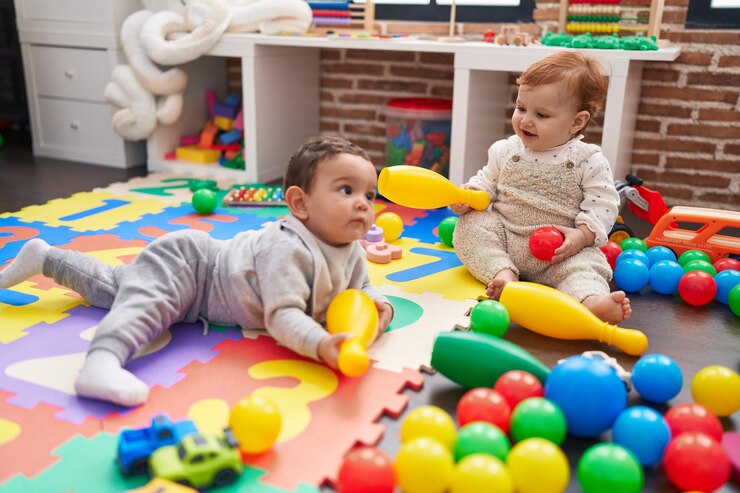Introduction
Social skills are an essential part of a toddler’s development, forming the foundation for building healthy relationships throughout their lives. During the toddler years, children are learning how to communicate, cooperate, and navigate the social world around them. Although every child develops these skills at their own pace, parents play a critical role in guiding and encouraging positive social interactions. This blog will explore key strategies that parents can use to promote social skills development in toddlers, setting the stage for successful friendships and relationships in the future.
1. Encourage Playdates and Group Activities
One of the best ways to foster social skills in toddlers is by providing them with opportunities to interact with peers. Regular playdates or participation in group activities allow toddlers to practice important social behaviors like sharing, taking turns, and communicating with others.
- Set Up Playdates: Arrange playdates with children of a similar age, giving your toddler the chance to engage with peers in a safe and familiar environment. Start with shorter playdates and gradually extend the time as your child becomes more comfortable with socializing.
- Join Parent-Child Groups: Enrolling your toddler in group activities, such as music or movement classes, allows them to interact with other children in a structured setting. These activities offer opportunities for toddlers to observe and imitate positive social behaviors.
- Model Positive Interaction: During playdates or group activities, be present and model positive interactions. Show your toddler how to greet others, ask to join in, and share toys. Toddlers learn by observing the behavior of adults and peers, so modeling appropriate social skills is key.
2. Teach Empathy and Understanding of Emotions
Toddlers are just beginning to understand their own emotions and the feelings of others. Teaching empathy and helping your child recognize emotions in themselves and others can significantly enhance their social skills.
- Label Emotions: Help your toddler identify and label their emotions by using simple phrases like, “You seem upset,” or “I see that you’re feeling happy.” This not only teaches emotional vocabulary but also encourages your child to express their feelings in words rather than actions.
- Talk About Others’ Feelings: Encourage your toddler to consider how others might feel in different situations. For example, if another child is crying, you can say, “It looks like they are sad. What do you think we can do to help them feel better?” This helps toddlers develop empathy by thinking about the perspectives of others.
- Praise Empathetic Behavior: When your toddler shows kindness or empathy, such as comforting a friend or sharing toys, acknowledge and praise their actions. Positive reinforcement encourages your child to repeat those behaviors in future social interactions.
3. Provide Opportunities for Independent Problem-Solving
While it’s tempting to step in and resolve conflicts for toddlers, allowing them to navigate simple social challenges on their own helps build important problem-solving skills. Learning how to negotiate, compromise, and find solutions independently boosts confidence and social competence.
- Guide, Don’t Solve: When conflicts arise during playtime, guide your toddler through the problem-solving process instead of immediately intervening. Ask questions like, “What happened?” or “What can we do to make it better?” These prompts encourage your child to think through the situation and come up with solutions.
- Offer Simple Choices: Providing toddlers with choices in social situations gives them a sense of control and teaches decision-making skills. For instance, if two children want to play with the same toy, offer choices like, “Would you like to take turns or play with something else?” This encourages compromise and cooperation.
- Teach Conflict Resolution: Help your toddler understand that disagreements are a natural part of social interaction, but it’s important to resolve them peacefully. Use role-playing or storytelling to demonstrate how to solve conflicts calmly and respectfully.
4. Encourage Sharing and Taking Turns
Sharing is a challenging concept for toddlers, as they are just beginning to understand the idea of ownership and fairness. However, teaching your toddler to share and take turns is crucial for positive social interactions.
- Practice Sharing at Home: Introduce sharing during playtime by taking turns with toys or games. For example, you can say, “It’s your turn to stack the blocks, and then it will be my turn.” This helps toddlers understand the concept of taking turns in a fun and interactive way.
- Use Timers: When toddlers struggle with sharing, using a timer can make taking turns more tangible. Set a timer for a few minutes and explain, “When the timer goes off, it will be your friend’s turn.” This visual aid helps toddlers grasp the idea of fairness and waiting for their turn.
- Praise Sharing Efforts: When your toddler successfully shares or takes turns, offer praise and encouragement. Positive reinforcement, such as saying, “Great job sharing your toys with your friend,” reinforces the behavior and motivates your child to continue practicing it.
5. Model Positive Social Behaviors
Children are keen observers and often mimic the behaviors they see in adults. By modeling positive social behaviors in your interactions with others, you provide a strong example for your toddler to follow.
- Demonstrate Respectful Communication: Show your toddler how to communicate respectfully by using polite language, listening actively, and expressing your emotions calmly. Toddlers learn how to interact with others by watching how adults handle social situations.
- Use Kind Words and Actions: Be mindful of using kind words and gestures in front of your child, whether interacting with family, friends, or strangers. Toddlers are likely to imitate behaviors that they see regularly, so modeling kindness and respect is key to fostering positive social skills.
- Involve Your Child in Social Situations: Include your toddler in family gatherings or social outings, giving them opportunities to observe and participate in group interactions. During these events, encourage your child to say “hello,” “please,” and “thank you,” which helps them practice important social manners.
Conclusion
Toddler social skills development is a gradual process that requires patience, guidance, and encouragement. By providing opportunities for peer interaction, teaching empathy, allowing independent problem-solving, and modeling positive behavior, parents can help their toddlers develop the social skills they need to form healthy relationships. These early social experiences lay the foundation for future friendships, cooperation, and emotional well-being.


1 thought on “Encouraging Toddler Social Skills Development: Building Foundations for Healthy Relationships”